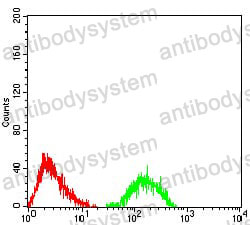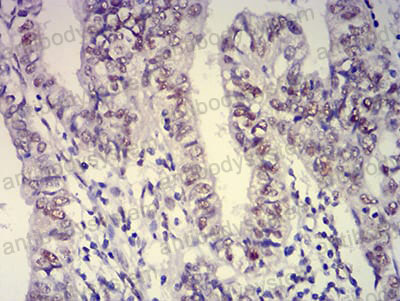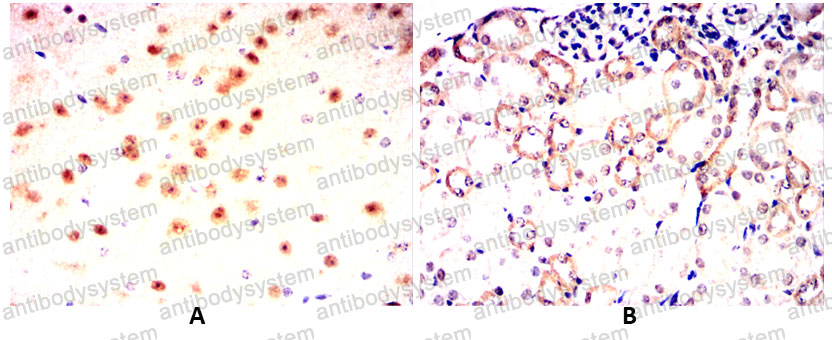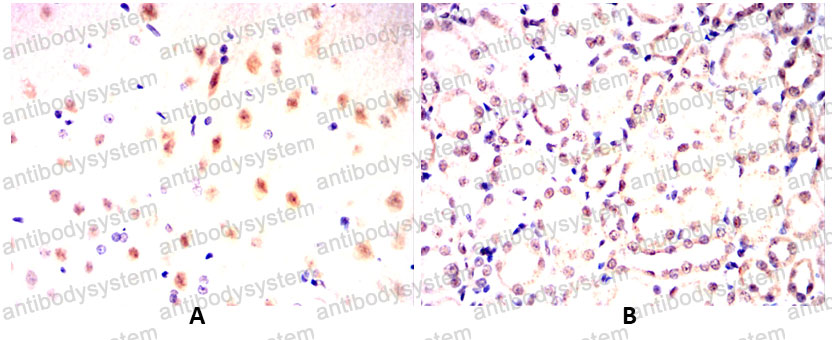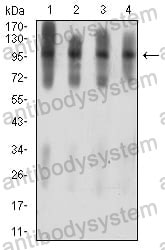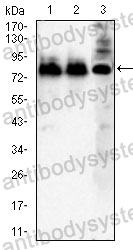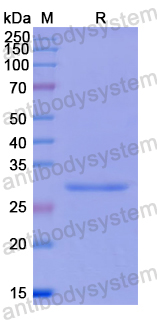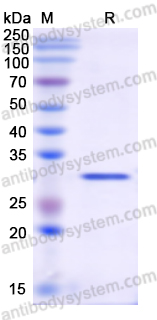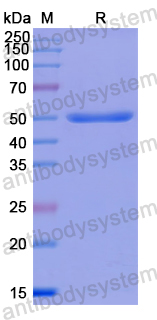Catalog No.
RHF02504
Species reactivity
Human, Mouse, Rat, Monkey
Host species
Mouse
Isotype
IgG1
Clonality
Monoclonal
Tested applications
ELISA: 1:10000, FCM: 1:200-1:400, IHC: 1:100-1:500, WB: 1:500-1:2000
Target
ATXN1, SCA1, ATX1, Spinocerebellar ataxia type 1 protein, Ataxin-1
Concentration
1 mg/ml
Endotoxin level
Please contact with the lab for this information.
Purity
>95% as determined by SDS-PAGE.
Purification
Protein A/G purified from cell culture supernatant.
Accession
P54253
Applications
ELISA, FCM, IHC, WB
Form
Liquid
Storage buffer
0.01M PBS, pH 7.4, 0.05% Sodium Azide.
Stability and Storage
Use a manual defrost freezer and avoid repeated freeze-thaw cycles. Store at 4°C short term (1-2 weeks). Store at -20°C 12 months. Store at -80°C long term.
Clone ID
R3N10
Accurate Quantification of Mutant and Wild-Type polyQ Proteins Using Simple Western Capillary Immunoassays., PMID:40450087
Construction and validation of a synthetic phage-displayed nanobody library., PMID:39198226
The novel multiple sclerosis susceptibility gene ATXN1 regulates B cell receptor signaling in B-1a cells., PMID:33478569
A new structure from cardiac cells cultured in vitro: Cardiomyocyte-annulation of neonatal rats., PMID:31245874
CD4+ TSCMs in the Bone Marrow Assist in Maturation of Antibodies against Influenza in Mice., PMID:30733641
A native interactor scaffolds and stabilizes toxic ATAXIN-1 oligomers in SCA1., PMID:25988806
An out-of-frame overlapping reading frame in the ataxin-1 coding sequence encodes a novel ataxin-1 interacting protein., PMID:23760502
Glial S100B protein modulates mutant ataxin-1 aggregation and toxicity: TRTK12 peptide, a potential candidate for SCA1 therapy., PMID:21384195
SUMO-1 interacts with mutant ataxin-1 and colocalizes to its aggregates in Purkinje cells of SCA1 transgenic mice., PMID:21308649
Expression and purification of ataxin-1 protein., PMID:20304006
BMP-2 and FGF-2 synergistically facilitate adoption of a cardiac phenotype in somatic bone marrow c-kit+/Sca-1+ stem cells., PMID:20443832
Unaltered repopulation properties of mouse hematopoietic stem cells transduced with lentiviral vectors., PMID:18684860
Identification of osteo-adipo progenitor cells in fat tissue., PMID:18616697
Expression, localization and tau exon 10 splicing activity of the brain RNA-binding protein TNRC4., PMID:17725984
Non-canonical Wnt signaling enhances differentiation of Sca1+/c-kit+ adipose-derived murine stromal vascular cells into spontaneously beating cardiac myocytes., PMID:17706246
Differential effects of polyglutamine proteins on nuclear organization and artificial reporter splicing., PMID:17526020
Role of tissue transglutaminase type 2 in calbindin-D28k interaction with ataxin-1., PMID:17442486
Antibodies to stem cell marker antigens reduce engraftment of hematopoietic stem cells., PMID:17008427
Identification of label-retaining cells in mouse endometrium., PMID:16456137
A cell-based screen for modulators of ataxin-1 phosphorylation., PMID:15757972
Proteasome function is inhibited by polyglutamine-expanded ataxin-1, the SCA1 gene product., PMID:15750336
RNA association and nucleocytoplasmic shuttling by ataxin-1., PMID:15615787
Slipped (CTG).(CAG) repeats of the myotonic dystrophy locus: surface probing with anti-DNA antibodies., PMID:12963369
Oxidative stimuli affect polyglutamine aggregation and cell death in human mutant ataxin-1-expressing cells., PMID:12893416
Temporal patterns of bone marrow cell differentiation following transplantation in doxorubicin-induced cardiomyopathy., PMID:12757879
Phenotypic effects of expanded ataxin-1 polyglutamines with interruptions in vitro., PMID:11719269
New anti-huntingtin monoclonal antibodies: implications for huntingtin conformation and its binding proteins., PMID:11719267
Identification and characterization of an ataxin-1-interacting protein: A1Up, a ubiquitin-like nuclear protein., PMID:11001934
Mutation of the E6-AP ubiquitin ligase reduces nuclear inclusion frequency while accelerating polyglutamine-induced pathology in SCA1 mice., PMID:10624951
The expanding world of ataxins., PMID:8896544
Polyglutamine expansion as a pathological epitope in Huntington's disease and four dominant cerebellar ataxias., PMID:7477379

